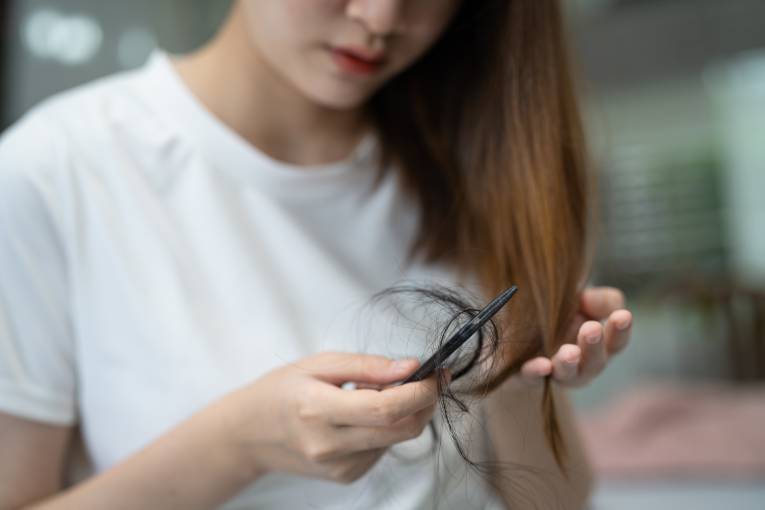Losing your hair can be extremely distressing, whether you're experiencing temporary hair loss or permanent hair loss. For both women and men, hair is a key defining feature, so we truly understand how traumatic hair loss can be.
We've created this page to be a source of comfort for you, explaining what hair loss is, what can cause hair loss and how you can deal with losing your hair.
This page answers the following questions:
- What Is Hair Loss?
- How Much Hair Loss is Normal?
- What Are the Causes of Hair Loss In Women?
- What Is the Difference Between Hair Loss and Hair Shedding?
- How Can I Stop My Hair Loss?
- 5 Things You Need to Remind Yourself About Hair Loss
- Why Talking About Hair Loss Is Important
What Is Hair Loss?
Hair loss is medically defined as alopecia.
The NHS have suggested that female-pattern baldness, which is the most common form of hair loss, impacts roughly 40% of women who are 70 years old or above. However, you don't have to have lost all of your hair in order to be experiencing hair loss, as losing hair can be classed as hair thinning too.
Hair loss can happen to anyone either suddenly or over time; if you’re experiencing hair loss you're definitely not alone. Whether you're experiencing extensive hair loss, bald spots, patchy hair loss or even a receding hairline, we understand that hair loss of any kind can be extremely distressing and upsetting but there are things you can do to help cope with your hair loss better and feel more comfortable day-to-day.
Read our blog on how to cope and deal with alopecia hair loss or hair loss from chemotherapy.

How Much Hair Loss is Normal?
Losing hair is normal and the NHS estimated that we lose anywhere from 50 to 100 hairs per day. Anything above this amount can be classed as excessive hair loss.
What Are the Causes of Hair Loss in Women?
If you're concerned about losing your hair and are wondering why you're currently experiencing hair loss, take a look at our list of potential causes below.
Mental & Physical Stress
Sometimes in life, we, unfortunately, go through some events that are extremely stressful. This may include falling ill, losing someone close or mental illness, which can all result in losing hair. Other times, we go through stressful events that although can lead to a positive outcome such as giving birth, can also lead to hair loss.
Going through major physical and mental stress can sometimes lead to telogen effluvium hair loss, which is characterised by there being a noticeable rise in the amount of hair shed. This type of hair loss can also be classed as hair thinning.
Why Does This Happen?
Research has suggested that stress reduces the hairs in the growth stage and forces a greater amount to the resting stage, resulting in telogen effluvium hair loss. As well as stress causing telogen effluvium hair loss, it can also cause trichotillomania and alopecia areata.
Physical Stress That Can Lead To Telogen Effluvium Hair Loss
This can be a result of an illness, extreme weight loss, surgery, as well as other events that are seriously physically demanding on the body such as having a baby.
Postpartum Hair Loss
Lots of women who fall pregnant find that post-birth, their hair temporarily falls out. Postpartum hair loss or hair thinning happens because of the decline in estrogen that occurs after having a baby.
Mental Stress That Can Lead To Telogen Effluvium Hair Loss
Life stresses are inevitable. However, those that go through a majorly emotionally stressful time in their life, such as experiencing the death of someone close or a mental illness, can suffer from hair loss as a result.
Hair Loss Caused by Medication
Some medications such as for blood pressure and gout can result in telogen effluvium hair loss. Always ensure you consult your doctor if you think you're experiencing hair loss due to your medication.
Chemotherapy Hair Loss
Cancer is a horrific disease and unfortunately, many people experience it within their lifetime. When going through cancer treatment, hair loss is often a side effect.
It is extremely upsetting that whilst going through cancer treatment, you also have to deal with potentially losing hair. Chemotherapy can cause hair loss because whilst working on your cancer cells, it also fights off other growing cells, such as your hair.
If you're going through chemotherapy there are options available to you to help you feel more in control of losing your hair, such as purchasing wigs for cancer patients.
Hair Loss Caused by Variations in Hormones
Hair loss can occur because of the variations in hormones as a result of taking birth control pills, going through menopause or pregnancy.
If you're experiencing hair loss due to any of the above, make sure you speak to a medical professional and your loved ones to help give you the support that you need.

Hairstyles
Traction alopecia hair loss occurs because of hairstyles such as cornrows and ponytails, whereby the hair is forced into a tight hairstyle, resulting in hair falling out.
Ultimately, these types of hairstyles could lead to bald patches and hair thinning.
Genetics
One of the factors that cause female pattern hair loss and male pattern baldness, is genetics. For example, androgenetic alopecia (which is often referred to as female pattern baldness and male pattern baldness) is a result of genetics and causes different patterns of hair loss for each gender.
Alopecia Areata
Alopecia areata can result in someone losing hair in patches due to an autoimmune disease.
What Is the Difference Between Hair Loss and Hair Shedding?
Hair loss occurs when there is a complete absence of hair growth, whereas hair shedding is when hair sheds excessively more than normal.
Telogen effluvium is classed as hair shedding.
How Can I Stop My Hair Loss?
If you're going through hair loss, you're probably wondering what hair loss treatment is available, what type of hair loss you have and how to slow hair loss down.
The first thing you should do is contact your GP so that they can give you some medical advice and advise you on your situation.
If you're wanting your confidence back after experiencing hair loss, then why not try a wig? Wigs are a great way to make you feel like yourself again. Discover comfortable ladies wigs available online.

5 Things You Need to Remind Yourself About Hair Loss
We've explained a small handful of factors that can cause hair loss, such as mental & physical stress, medication, alopecia areata, chemotherapy, variations in hormones, hairstyles and genetics.
Going through hair loss, no matter what your age or whether it's temporary or permanent, is extremely tough. If your hair loss is upsetting you, then please don't suffer in silence, make sure you get help. Whilst it may not feel like it at the time, you can get through hair loss! There are options out there for you and support to get you through this challenging time.
Whether you're experiencing thinning hair, a receding hairline, complete or excessive hair loss, these are 5 things you need to remember:
1. You’re Not Alone!
Experiencing hair loss, especially for the first time, can be devastating. According to the Wimpole Clinic, 35 million men and 21 million women experience alopecia or hair loss globally. So make sure you remind yourself that many people suffer from hair loss, and so you're definitely not alone in your situation.
Sometimes, knowing that there are others out there who are going through the same thing that you are can be really comforting.
2. Be Kind to Yourself
Hair can often be a large part of your identity, so experiencing hair loss can be a shock. That's why when hair loss occurs for the first time, you need to make sure that you're kind to yourself.
You're going through a big change and it's okay not to be okay! Take the time to feel the feelings that you're experiencing and let it all out.
3. Talk to a Loved One
Don't be afraid to reach out to a loved one, whether that's a family member or friend, to help you when you're going through hair loss.
There are always people out there who can help support you through this time of your life, and that's what family and friends are for.
4. Consider Joining a Support Group
If you have alopecia and feel that you need to talk to someone who is going through what you're going through, then why not attend a support group?
Alopecia UK run support groups to give you the opportunity to speak with those that also suffer with alopecia. They offer groups for adults, teens and children, so whether it's yourself or a loved one that is experiencing hair loss, there is a group for everyone.
5. You Can Do Something About Hair Loss
Whether you're experiencing permanent hair loss, patchy hair loss or thinning hair, there is something you can do.
Wigs can be an alternative solution for when you're going through hair loss, as they can provide you with the confidence to tackle the world again.
If you need any help with finding a wig, we've written a post sharing our advice on choosing wigs for hair loss.
Alternatively, take a look at Claire's story, a customer who regained her confidence after experimenting with wigs for alopecia.

Why Talking About Hair Loss Is Important
Talking about hair loss is important because understanding the causes of hair loss helps to raise awareness.
The more open we are about talking about hair loss means that we can help to normalise it and show those that suffer from hair loss that they're not alone.
We’re Here to Help You Get Through Hair Loss
At Joseph's Wigs, we offer a range of ladies wigs and wigs for men, in a variety of wig colours and wig styles. Contact us if you'd like to make an appointment so that we can help you find the right wig for you. For more advice and information, we have categories within our blog dedicated to alopecia and hair loss, cancer and hair loss and more.












